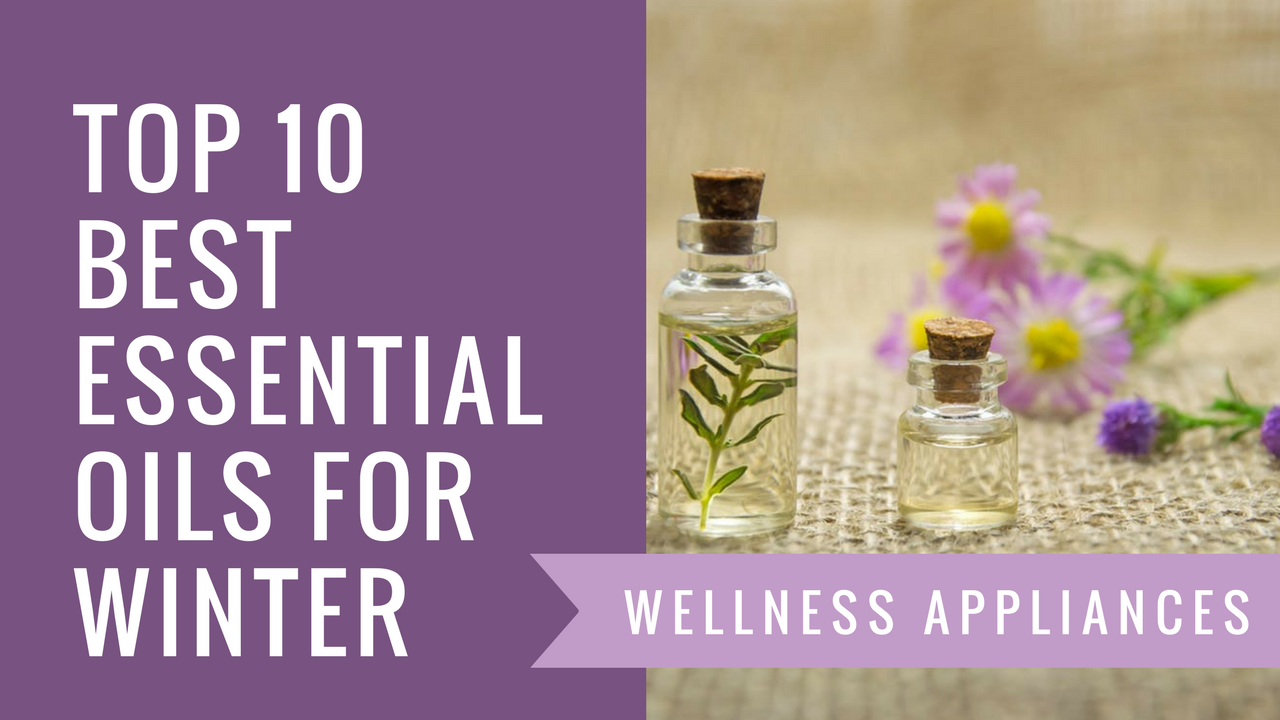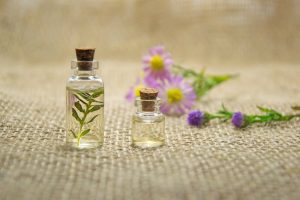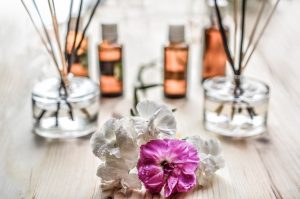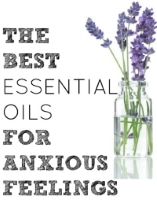Contents
- 1. Eucalpytus (EUCALYPTUS GLOBULUS)
- 2. Thyme (THYMUS VULGARIS)
- 3. Tea Tree (MELALEUCA ALTERNIFOLIA)
- 4. Rosemary (ROSMARINUS OFFICINALIS)
- 5. Black Pepper (PIPER NIGRUM)
- 6. Cinnamon (CINNAMOMUM VERUM)
- 7. Peppermint (MENTHA PIPERITA)
- 8. Sage (SALVIA OFFICINALIS)
- 9. Pine Needle (PINUS SYLVESTRIS)
- 10. Ginger (ZINGIBER OFFICINALE)
Winter can be a beautiful time of the year. Pure white snow gleaming in the sunlight, bright days with clear blue skies and starry nights with hundreds of constellations above our heads. This would all be lovely beyond measure if not for the freezing cold and the biting wind, messing your life up with such nuisances as dry and itchy skin or the common cold among other respiratory diseases.
With all the viruses traveling around, winter can be a tough time for our immune systems. Not to mention the depressive darkness that can leave a mark on your mood if you happen to live in the Northern hemisphere.
However, there is a solution. And surprisingly it’s a completely natural, safe and wonderful remedy that will help you and your family enjoy the winter season with no worries. Yes, you guessed it, we are talking about essential oils. So that you could make the best of this time of the year below we have comprised a list of the Top 10 best essential oils for winter.
1. Eucalpytus (EUCALYPTUS GLOBULUS)
The essential oil of the plant beloved by every koala is a must for the cold season. Eucalyptus essential oil protects the body in winter as it has anti-inflammatory, antibiotic and antiseptic properties. In addition to being effective as an insect repellent, eucalyptus globulus helps ease cough, sinusitis, bronchitis, cold and flu symptoms, and even ear inflammation.
In fact, during World War II one of the greatest authorities in essential oil therapy, Jean Valnet, used eucalyptus essential oil as a substitute for antibiotics when he ran out of them. It killed almost three quarters of staph bacteria in the air!
How to use it
If you are battling the cold or other respiratory ailment, one of the most effective ways of using eucalyptus essential oil are inhalations. Put one drop of therapeutic grade eucalyptus essential oil in a bowl, pour in hot water, cover your head with a large towel and lean over the bowl.
Keep your eyes closed and breathe in the hot steam for about 5 minutes. This should open your respiratory tract and leave you feeling refreshed. You can also dilute the essential oil and rub on your feet for an additional effect.
2. Thyme (THYMUS VULGARIS)
This masculine aroma is extremely powerful and thus should be used with great care, never applying to skin undiluted and never using it on children. The cleansing and purifying thyme essential oil is one of the most effective antivirals, so having it at home is a must during the flu season.
It is also antibiotic and antiseptic, and strengthens the immune system. The smell of thyme is stimulating as well, so if you start feeling drowsy and tired, breathe in its aroma. You will be back on your feet in no time!
How to use it
To avoid getting sick during winter, make it a habit to regularly diffuse thyme oil in your home (approximately 4-5 drops to a 20m2 room). Boost your immune system with a blend of one drop of thyme essential oil, 3 drops of lemon essential oil and 10 ml of carrier oil of your choice. Massage it on the lymph nodes of your neck and under the jaw.
3. Tea Tree (MELALEUCA ALTERNIFOLIA)
If winter weather makes you more prone to cold sores or herpes, tea tree essential oil is just what you need. In addition to being anti-viral, anti-bacterial and anti-fungal, it is perhaps the most powerful natural antiseptic you can find.
No wonder the aborigines have used this tree as medicine for hundreds of years! The valuable tea tree essential oil will help heal minor wounds and alleviate dandruff and psoriasis which often flare up come winter.
How to use it
In case of a cold sore, apply a drop (or less) of tea tree essential oil to the affected area twice a day. If your skin is sensitive, you can dilute a drop of essential oil in a teaspoon of carrier oil (like jojoba or almond oil) and apply a bit of the mixture.
If you use a natural and unscented shampoo add about 10 drops of tea tree essential oil to 8 ounces (about 250 ml) of shampoo to reduce dandruff, or mix 5 drops of tea tree oil with 10 ml of carrier oil and apply to the scalp 15-30 min before washing your hair. This blend can also help reduce psoriasis.
To avoid germs responsible for the cold, flu and other viruses, add tea tree essential oil to liquid castile soap (15-20 drops to 250 ml) to make a natural hand disinfectant. If you are not too fond of the strong smell of tea tree, add a few drops of lavender, rosemary or peppermint essential oil as well.
4. Rosemary (ROSMARINUS OFFICINALIS)
The fresh, sweet and herbal fragrance of rosemary essential oil stimulates the body and mind thus making it fit as a mood lifter during the short winter days. Rosemary has long been considered an elixir of youth and a symbol of love, as well as a harbinger of wealth.
Turn to this antibacterial, antioxidant, antiseptic and decongestant essential oil in case of respiratory discomfort, colds and congestion, coughs, flu and headaches.
How to use it
Rosemary essential oil can be used in a number of ways. Diffuse it to disinfect the air in your home or office, use it in steam inhalations if winter weather is starting to catch up on you, rub it on your lymph nodes and/or chest area in case of a cold, cough or similar symptoms.
For cautionary measures, dilute it with a carrier oil prior to use (e.g. a drop of EO to a teaspoon of carrier oil like grape seed or coconut).
5. Black Pepper (PIPER NIGRUM)
You might have the impression that black pepper essential oil must be harsh and unpleasant to breathe in as it is with ground pepper. However, that is not the case as in reality this essential oil has a warming, energising and strengthening effect, and it is actually quite pleasant for the smell receptors.
As well as promoting courage and providing a warming effect, black pepper essential oil can help alleviate sinus infections.
How to use it
To cast away the winter fatigue or help fight sinusitis, create a blend of 2 drops black pepper essential oil, 1 drop cardamom essential oil and 2-4 drops of citrus essential oil of your choice diluted with 10 ml of carrier oil. Apply the mixture to the sinus area and under your nose in case of sinusitis, or on your neck and wrists for an energy boost.
6. Cinnamon (CINNAMOMUM VERUM)
The wonderfully smelling cinnamon oil rich in antioxidants is one of the oldest know essential oils dating to Ancient Egypt. And since it is believed that grave robbers historically used it against plague, one can suspect the potency of it.
This antibacterial, antiseptic, antiviral, antimicrobial, anti-infectious, anti-inflammatory, warming and antidepressant oil will guard you against the winter blues and viruses, stimulate the immune system, relieve cough, as well as flu and cold symptoms and help in case of a sore throat.
How to use it
The strong smell of cinnamon essential oil reflects its intensity thus never use this oil undiluted because it can irritate the skin. Mix it with a carrier oil in a 1:1 ratio and apply to the skin or diffuse it in your home. Try blending such essential oils as clove bud, peppermint, cardamom and nutmeg to create a cosy winter mood.
7. Peppermint (MENTHA PIPERITA)
Another plant with a rich history and a large family as well, existing among several hundreds of mint species, Mentha piperita is a versatile and beloved essential oil.
Use the antibacterial, anti-inflammatory and antiviral properties of peppermint essential oil to combat the flu, bronchitis and other respiratory infections, as well as headaches and fatigue. Peppermint oil can also be used to moisturise dry skin.
How to use it
Diffuse it at your home or office, or dilute with a carrier oil 1:1 and apply to skin depending on the need (e.g. chest area, lymph nodes, sinuses or dry patches). Use one drop of peppermint essential oil in steam inhalations, or make bath and shower bombs with peppermint, rosemary and pine or eucalyptus oil for the ultimate respiratory relief and refreshment.
8. Sage (SALVIA OFFICINALIS)
The herbaceous, slightly fruity and camphoric sage has been used for centuries both in culinary and medicine. Burning smudge sticks with dried sage is still used as a way to purify the air physically and mentally.
But if you want to enjoy the full potential of this plant, turn to sage essential oil which has powerful antibacterial, antimicrobial, antiseptic and anti-inflammatory properties among others, helping soothe coughs, bacterial infections affecting the throat, ears and nose, and alleviating fever.
How to use it
Sage essential oil is best to either diffuse or apply diluted to skin in small amounts. Mixing sea, Himalayan or Epsom salt with 2-3 drops of the oil will make a healing bath to which you can add a couple of drops of lavender, rosemary or pine for an even better effect. Rubbing the diluted essential oil on your feet will also make a difference.
NB! Sage essential oil should be used with the utmost care because of the high levels of thujone. Never use it undiluted.
9. Pine Needle (PINUS SYLVESTRIS)
If you have ever taken a walk in a pine forest, you know that the smell of pine is both refreshing and relaxing. The antibacterial, anti-inflammatory, antiviral, decongestant and disinfectant pine essential oil is a wonderful remedy for the symptoms of a cold, cough and other respiratory problems.
How to use it
Use pine essential oil in a diffuser or in steam inhalations as described before. Dilute it with carrier oil and rub on your chest, lymph nodes, sinuses and feet to alleviate respiratory symptoms.
You can also add 4-5 drops of pine essential oil mixed with sea, Himalayan or Epsom salt to a warm bath creating an excellent immunity and mood booster. Another useful application for pine essential oil is adding 10-20 drops of the oil to 5 l of warm water and a bit of vinegar for a disinfectant floor mopping water.
10. Ginger (ZINGIBER OFFICINALE)
The warm, spicy and somewhat bitter ginger essential oil is another powerful plant essence that helps combat respiratory infections, congestions, a sore throat and tonsillitis, as well as fever. It is antibacterial, anti-inflammatory, antiseptic, warming and stimulant, making it a perfect fit for the winter.
How to use it
If you are starting to feel under the weather, add a drop of ginger essential oil to a cup of green tea, and drink it once or twice daily. Diffuse it to improve your mood, dilute and rub on the chest and feet to strengthen your immunity, or mix a few drops with salt and add to a bath. Combine with other warming essential oils, such as cinnamon or cardamom for an enhanced effect.
If you stayed until the end, now you have invaluable knowledge that could help you and your family and friends get through this winter safe and well without going to the pharmacy! Well, perhaps only if the pharmacy sells high quality medicinal grade organic essential oils (the kind you should always use).
Either way, remember to add some or all of these 10 best essential oils for winter to your home apothecary, and stay healthy and resistant to viruses and other winter worries.
Caution! Always conduct a patch test on the skin when trying out a new essential oil, and avoid using essential oils undiluted as well as ingesting them without prior knowledge. It is best to consult a medical practitioner before using any essential oil, especially in the case of pregnancy, epilepsy or when used on children. This article does not substitute professional medical advice, and is meant for general information purposes only.
For more on uses of essential oils, and different things they can be used for, please check out our complete list of essential oils and what they can be used for here.

















